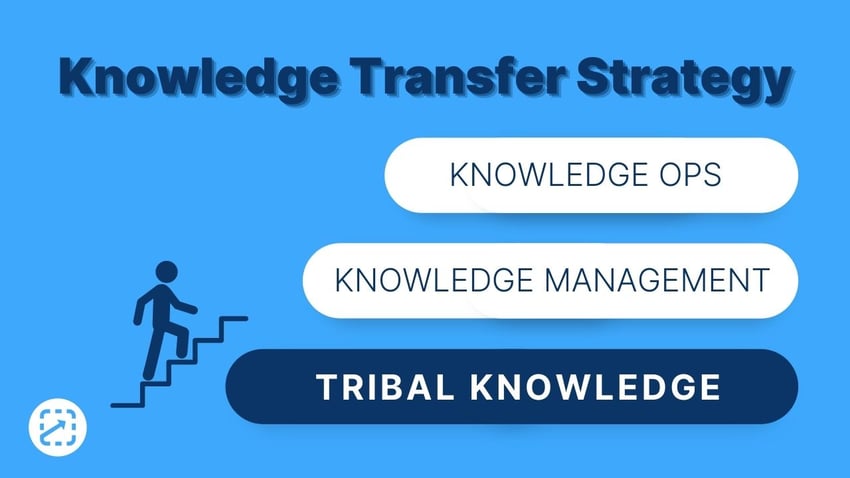What is Tribal Knowledge? (+ Video)
Is your company dependent on tribal knowledge?
Do operations slow down or stop when a subject matter expert takes the day off of work? Are supervisors bogged down with a steady flow of questions?
Your business may be operating using tribal knowledge.
Working for ScreenSteps — a knowledge ops solution — we’ve studied the effects of different knowledge transfer strategies on businesses. Tribal knowledge is the most common knowledge transfer approach, and, yet, it is the most ineffective.
Watch this 2.5-minute video for an introduction to tribal knowledge. Then read further for more details on how to determine if your company is operating using tribal knowledge. And learn more about other knowledge transfer options.
What is tribal knowledge?
Tribal knowledge is information that resides in employees’ heads. The information isn’t physically captured anywhere. It is an informal or passive way of retaining and sharing procedural and operational knowledge.
Typically, tribal knowledge is transferred from one person to another via word of mouth. It is unwritten knowledge. However, it can also be shared via email or a messaging system, like Slack or Teams.
The only way for employees to access this information is to ask the experts, coworkers, and supervisors questions.
Some alternative terms (though less common) that refer to tribal knowledge include:
- Institutional knowledge
- Tacit knowledge
- Legacy knowledge
The important thing to know is that, whatever term you use, tribal knowledge is the concept of passing knowledge between a specific group of people.
Challenges when operating with tribal knowledge
As far as knowledge transfer strategies go, tribal knowledge is the lowest level.
Tribal knowledge is more of a default setting than a knowledge transfer strategy. It is what companies fall back on when their current training, operations, and knowledge management strategies aren’t working for sharing knowledge.

So, why is tribal knowledge a poor knowledge transfer strategy?
Some of the challenges your organization has when operating with tribal knowledge include it:
- Leaves more room for costly errors
- Relies on employee memorization, which means longer training sessions
- Creates inconsistent operations
- Requires repeated labor (duplicating work over and over again)
- Slows downs operations
For a more complete list and explanation of risks associated with tribal knowledge, read this article on 11 risks businesses take when operating with tribal knowledge.
Is your organization relying on tribal knowledge?
A company operating using tribal knowledge usually looks like employees frequently tapping on neighbors’ shoulders to ask questions or reaching out to a supervisor to get answers.
If a subject matter expert takes the day off and you can’t handle procedures because only that person has the necessary knowledge, you are dependent on tribal knowledge.
Basically, if your company almost completely relies on word-of-mouth, shadowing, and digging through old emails or chat conversations, then you are dependent on tribal knowledge.
How can you fix the tribal knowledge problem?
If you want to move away from knowledge and the challenges associated with it, you need a new knowledge transfer strategy. That means moving into a knowledge management or knowledge operations strategy.
Ultimately, if you want to avoid tribal knowledge, then it’s important to create a centralized knowledge hub. Your knowledge hub is a place where employees can document important information, update procedures, and create guides that are easy to find and follow.
Get the information out of your expert’s head and into a centralized location where other employees and/or customers can access it. This way, everyone can access the knowledge they need without relying on individual memory or constant interruptions.
Escape tribal knowledge and develop a better knowledge transfer strategy for your business
Tribal knowledge is the status quo in business. But, that creates a lot of challenges when it comes to managing and transferring knowledge.
When you use a more advanced knowledge transfer strategy, your employees become more independent, make fewer mistakes, and provide consistent services.
With our ScreenSteps knowledge ops solution, we provide a centralized knowledge ops platform that helps your company be agile with constant change. It puts all the answers your employees need at their fingertips.
Of course, that is when you operate at the highest level of knowledge transfer — using a knowledge ops strategy.
Is your business operating with tribal knowledge? Find out what level of a knowledge transfer strategy you are operating at as well as see what it will take to advance to a higher level of knowledge transfer by taking this short self-evaluation.


.png)

